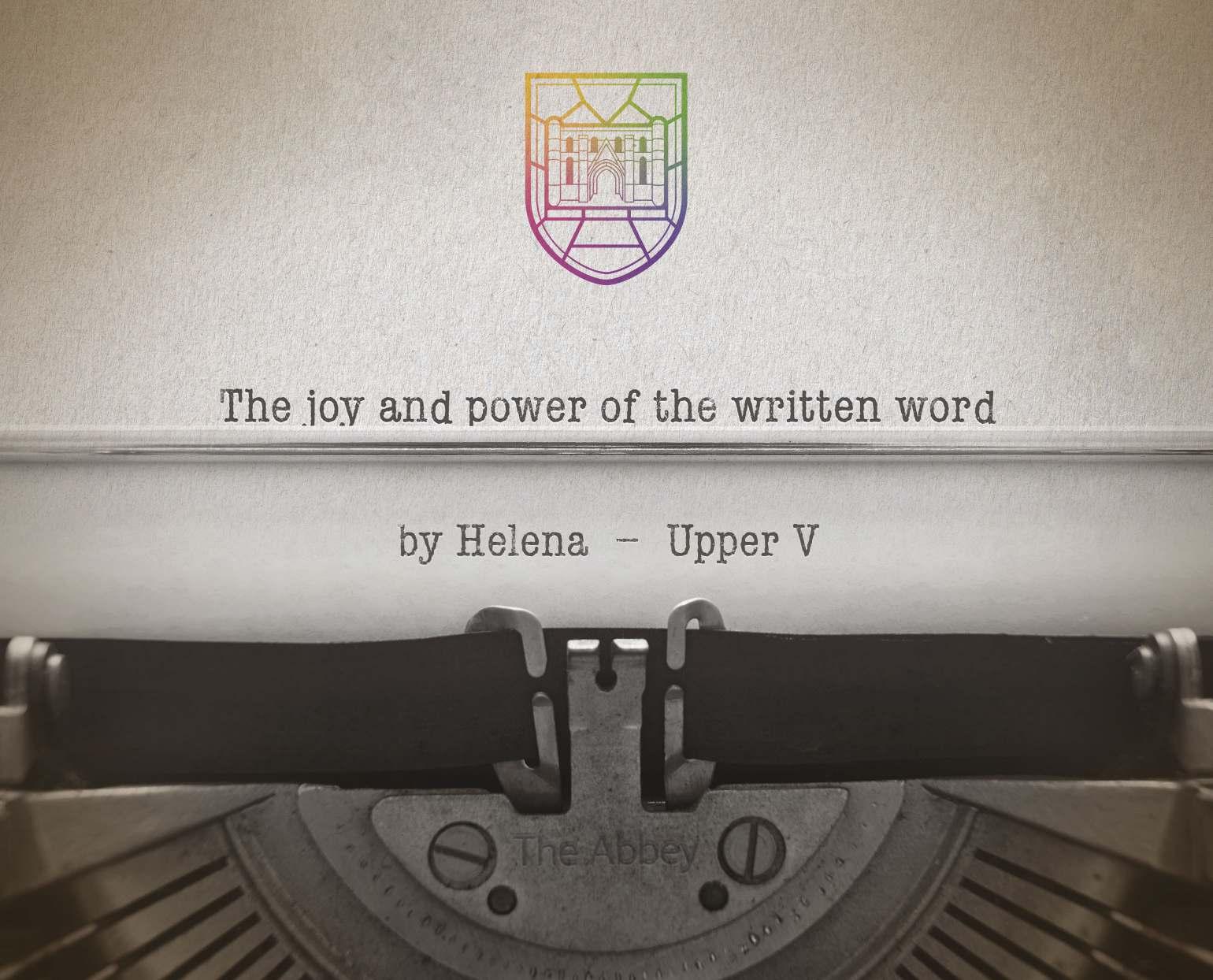




The written word is the underlying force of change in our world, silently shaping our lives from cradle to grave.
From Austen to Orwell, Darwin to Descartes, the power of the written word to expand our horizons, socially, politically, emotionally, spiritually and intellectually provoking the individual, is undeniable. However, its influence extends beyond this - the written word can ignite a zeal in humanity. Whether it be in a text from your friend or in the books you read as a child, the induced elation we experience on sight is a universal, even innate reaction, triggering a multitude of positive effects.
Having catalysed our development throughout history, all manner of written literature, manifestos and media continue to shape us as individuals and society as we know it, holding the reins that shift social norms and shape our inner mindsets. It is a striking feat to imagine a world without the written word, to wonder whether civilization would have even come close to its current calibre. These assorted
letters provide us with an infinitely accessible pathway, a tangible medium with which to understand the world around us and unlock the answers to our past and future; they bind us together in communal understanding, uniting minds across generations and encouraging the embrace of new ideas and knowledge. Unlike the spoken word, it is this capacity to endure that lends such immense strength to the written word, enabling our continual adaptation, progression and formulation of new ideas across time. Thus, throughout this article I will explore just how powerful the written word is in affecting our personal and societal growth and the joy we as humans may gain from the enlightenment it brings.
“Words create worlds”
Initially attributed to philosophers including Heschel and Wittgenstein, paradoxically, the brevity yet distinctly profound nature of this phrase
highlights writing’s momentus impact. In just a few short syllables, this statement reveals to us the power our written words, a power so prodigious it can create abundant life from nothing.
Although alluding ostensibly to the physical impacts and changes our writing can have - improving healthcare, changing social norms, encouraging diversity - to me this phrase speaks of the creativity and vision works of fiction insight in young and old minds alike. From an early age, the prevalence of exciting, new literature invites us into far-fetched, fantastical realms, sparking a form of untamed excitement, capable of eradicating negative thoughts and giving fresh vigor to life. The books we read as children heavily shape our lives and help to define us as people via the morals and lessons these stories preach. By constructing established ideals and conceptualising our societal and personal understanding, these lessons prevail throughout our lives, becoming woven into our psyche, culture and world view. In this way, the written word has the power to
influence our thoughts and behaviours, instigating internal and external pragmatic change in our lives and the lives of those around us. A well recognised example of this would be ‘The Tortoise and the Hare’, one of Aesop’s more prominent fables.
Although preliminarily teaching the old adage ‘slow and steady wins the race’, one can also construe lessons of positive triumph over perceived failure or inadequacy, strength in one’s own power of conviction and determination and the sense of accomplishment in running one’s own journey irrespective of competition and external pressures. In short, stories can enhance the clarity of our ethical and religious reflection, leading to more accepting, tolerant viewpoints as a consequence of being faced with an infinite range of characters, cultures and crises that we may not otherwise come into contact with.
The dichotomy of such simplistic language evoking such complex effects, highlights the nurturing force of the written word, exemplifying how it is


a catalyst for the process of personal change.
Unlike academic writing, literature operates without a conscious mandate, creating an empathic link between reader, writer, characters, and ideas that are being presented. This subsequently broadens our views and forms an awareness of different personalities and cultures, different sides to a moral dilemma and the range of consequences that may follow.
Our early exposure to such diverse worlds forms a crucial part in our development, aiding both our creative dispositions, liberal thought process and imagination. Imagination itself is the key to innovation, colouring our entire existence and influencing everything we do, think about and create. It leads to elaborate theories, dreams and inventions in all professions, from the realms of academia to engineering and the arts, thus demonstrating the encompassing way in which the written word governs our world.
Moreover, regular subjection to fiction has also been shown to improve brain connectivity and functioning on a variety of levels, with findings that


reading fiction improves a reader’s ability to put themselves in another person’s shoes being cited in many psychological studies. This augmented aptitude for empathy improves our theory of mind *1 as well our ability to be compassionate. When performed, surveys showed changes caused by reading a novel were registered in the left temporal cortex, an area of the brain associated with receptivity for language, as well as the primary sensorimotor region of the brain. Neurons of this region have been associated with tricking the mind into thinking it is doing something it is not, a phenomenon known as grounded or embodied cognition, suggesting that reading a novel can actually transport you into the mind and body of the protagonist.
A study conducted by Robert Harris substantiates this notion, whereby enhanced brain connectivity was recorded in the sulcus region (associated with sensations and movement) of students in the morning following a reading assignment. Similarly, reading has been demonstrated to increase the capacity of our working memory as well as attention spans. Crucially, the written word holds the power to
change the self, helping to construct our world view and interaction with society. It enables the reconfiguring of our neural networks and imaginations, giving us an improved understanding of our identities and how we fit within the perceived world around us, simultaneously causing us to question our paradigm - what we believe to be true about ourselves and the world around us. It essentially shapes our lives and the world as we see it, also advancing our brains. The written word can invoke substantial change. It exerts a titan influence on our thoughts, behaviours and actions and as such has the power to extend its command over society.
*1 The ability to attribute mental states to ourselves and others, serving as one of the foundational elements for social interaction.
Further to this, whether you find yourself lost in Hardy’s rambling countryside or fighting on the front line with Wilfred Owen, this pure form of encapsulated escape is a cathartic balm for the soul, helping to alleviate our worries and provide an enjoyable distraction from the sometimes harsh reality of modern life. In a finite number of pages, a story will open, evolve and close, forming a striking juxtaposition with the chaotic, unstructured and infinite progression of real life and
allowing us to emancipate ourselves from the confines of contemporary life and its pressures with may challenge the rational mind. Having frequented often in the fictional worlds of Tolkein and Tolstoy, I myself have found great solace in their enrapturing storylines and worlds, so far from the consuming challenges of reality. The ability that literature holds, to completely transport a person from their armchair to a mystical castle, to manipulate and transform sentiments of sadness, anger and confusion into awe, admiration and elation, deems the written word an unfathomable force for good.
The positive, more open mentality it fashions, out of daring dialogue and diverse descriptions have ensuing effects on the rest of our lives, promoting greater perspective, intellectual development and encouraging a healthier mindset and lifestyle.
Aside from catharsis, the written word in the form of academic provokation can also provide unfathomable joy, igniting a certain fervour that broadens the mind and inspires, generating a lasting intrigue and ambition. These powerful sentiments can drive an individual to success and guide them to their predestined path,
highlighting the importance of this knowledge. From the moment we set eyes upon a problem, be it maths question or English essay, our brains are immediately set into invigorated action.
However, it is the ubiquitous eureka moment that engenders the greatest development in our mindsets and intellectual capacities. Textbooks specifically play a key role in the educational process, establishing clear learning goals and ensuring that these are achieved. Whilst presenting questions at an accessible level, they also stimulate our academic evolution, stretching and challenging our minds and thus providing an ideal opportunity for growth.
Without this provocation and challenge of our understanding, we would fail to develop, plateauing at a constant level of ability and cease to realise the bounds of our potential. In this way, the written word can give rise to great change in our cognitive abilities. When faced with a puzzle, we are driven by the pre-emptive sense of joy we hope to experience as the solution miraculously appears to us. This rush of excitement at the moment of insight is triggered by an influx of dopamine
into the nucleus accumbens - a region of the brain forming part of the dopamine*2 network, activated when we receive a reward. Dopamine itself is the hormone responsible for our experience of reward and happiness, causing this intense moment of joy and relief at the moment of enlightenment. (Moreover, the repetition of this release on sight of a challenging question conquered serves as an incentive to learn, helping us to passively generate a growth mindset).
Furthermore, studies indicate a close correlation between dopamine, exhilaration, and creativity, noting that the eureka experience is more salient than anticipated, actually facilitating long-term memory storage and reinforcement capabilities. Therefore, the probing nature of textbooks provides more than just a sense of security within a framed academic domain, but extends to challenge and further our understanding, by improving the encoding process and nurturing a special form of fast retrieval. The substantial increase in dopamine demonstrates how the written word as a stimulus can physically induce a shift in our brain’s physiology, chemically generating joy and improving our moods.

*2 Dopamine is a type of neurotransmitter, used and made by your nervous system to send messages between nerve cells. It plays a role in how we feel pleasure and is a significant part of our ability to think and plan.
The genesis of personal prose too can also have a plethora of positive effects, helping us to meet our goals and even improve our quality of life. In the conundrum of the modern day, normal tasks can soon become overwhelming, permeating our minds with negative thoughts and leaving us feeling isolated and anxious. However, through the simple task of writing, change can be incited across a broad spectrum of issues, allowing us to clear our head,
“Whether you’re keeping a journal or writing as a meditation, it’s the same thing. What’s important is you’re having a relationship with your mind”
Natalie Goldberg
make important connections between thoughts, feelings, and behaviours, and even reduce the effects of mental illness.

Writing a diary can promote better mental health, providing us with a simple method with which to mitigate overwhelming sentiments and experiences, or even just express ourselves. On a scientific level, journalling and diary writing alike have many positive repercussions in the brain, influencing regions associated with emotional regulation as well as response inhibition and goal appropriate response selection.*3
In recent studies, psychologists have discovered that writing about our feelings can aid the brain in overcoming emotional upsets by reducing activity in the amygdala region (responsible for controlling the intensity of our emotions) and hence leaving us feeling happier and subsequently more apt to make better decisions.
Moreover, it was observed that members of a trial who wrote about an emotional experience showed more activity in a part of the brain called the right ventrolateral prefrontal cortex, which in turn dampened down neural activity, leaving them in a more composed, clear frame of mind. Irrespective of whether you choose to elaborate on your feelings in a diary, pen lines of poetry, or even jot down
song lyrics, writing seems to help the brain regulate emotion unintentionally and can help significantly in overcoming emotional distress and relieving stress. So prominently discernible is this effect in the brain that the power of the written word to alleviate our negative emotions is indisputable, highlighting its worth and sentimental value.
*3 Response inhibition refers to the suppression of actions that are inappropriate in a given context and that interfere with goal-driven behaviour.
In addition to this, expressive writing has been noted as beneficent for individuals suffering from anxiety, in recovery from various issues and suffering from psychological problems.
In terms of mental affliction from traumatic events, the effects of journaling are pervasive and incredibly powerful. By guiding individuals to confront previously inhibited emotions, helping them process difficult events and compose a coherent, rational narrative about their experiences, it works to enhance their mental health, cultivating a better mindset.
For those with depression, writing provides the opportunity to release and rationalise pent-up negative emotions,
encouraging individuals into a more positive frame of mind that helps them form a buffer between their negative thoughts and sense of wellbeing. The ramifications for those struggling with anxiety are also similar, empowering individuals to calm and clear their minds, explore their experiences and understand triggers and release pent-up feelings.
More importantly, it is a vital tool in allowing them to identify their negative automatic self-talk and access the root of their anxiety, essentially exposing the core of their troubles and making treatment far easier. However, perhaps the most extensive impacts can be observed in those recovering from pivotal events in their lives, including the death of a loved one, an eating disorder or even addiction.
By writing down their thoughts, feelings, and actions, this process of reflection allows individuals to discover, construct and maintain their authentic self, solidifying their identity which is vital in a time of personal crises. For the bereaved, journaling provides an opportunity to process and come to terms with their enormous emotional loss; for those grappling with an eating disorder, it can be a source of relief
and healing. It can help in confronting and clarifying issues, preventing a person from distancing themselves from their problems and reducing the obsessive, irrational component of the disorder. Finally for those struggling to overcome addiction, writing a diary can help to record struggles and accomplishments, providing the opportunity to work through difficult emotions in a healthy manner.
These positive impacts are not limited to afflicted individuals only but are applicable to each member of society. The written affirmation of clear, rational thoughts provokes the average person to become more self aware as well as detect unhealthy thought and behavioural patterns in themselves and others.
Overridingly, it prompts us to put things in better perspective and provokes greater self-efficacy and control over our lives, purposing a shift in mindset which may give us a more optimistic view of ourselves and the world. In simpler terms, physically writing can boost our mood, enhance our sense of wellbeing and reduce symptoms of emotional distress, demonstrating how this underrated medium is an important route to wellbeing, insighting

joy in our lives by catalysing a more positive mindset. Aside from changes in thought pattern, the physical act of writing also has certain physiological benefits, helping to strengthen the immune system, drop blood pressure, help you sleep better, and hence keep us healthier.
Overall, the formation of the written word can bring about momentous change in our psyche, offering a daily opportunity to relieve ourselves of stress and worry and understand more about ourselves. It facilitates the growth and development of a more productive, constructive mindset, helping us to overcome the daily challenges we face with tenacity and resilience rather than despondency and shame. In this way, the written word holds greater power over our lives than we could have formerly comprehended, channelling the pathway to a more joyful existence.
To conclude this analysis of the intrapersonal effect of the written word, I would argue that the mental and neural effects are vast, and probably extend beyond the current horizons of understanding. The wider ramifications on social norms, empathetic ability, identity and self-



conceptualisation as examined by literary theory deem the written word a crucial influence on the human experience. Through the consumption of the written word, whether it be in the form of a novel, textbook, diary or digital media, the evident capacity to provide overwhelming emotional release shapes our lives, deeming it of paramount importance.
changes:
In a wide world of continual change, there are also a multitude of interpersonal effects that prevail upon society as a whole. Literature, in its very essence, dismantles established beliefs and realities, where knowledge provides a force with which to question the scope of society’s fundamental truths. Within the realms of science, this proves an essential part of our development, enabling us to escape the incarcerating bounds of generic mob mentality, rather than plateauing in our accepting comprehension.
Pivotal scientific novels such as Origin of Species – Darwin, 1859 and Philosophiae Naturalis Principia Mathematica – Newton, 1687, have broken down societal beliefs, completely re-configuring our
understanding of the world around us and forging the pathway to further discovery.
In addressing concepts of evolution and human development, Darwin supplies the modern individual with foundations required to understand the progression of our past and future and questions the essence of religion.
Similarly, Newton’s revelation of the laws of motion and universal gravitation ameliorate our understanding of the physical world around us and improve our ability to develop in harmony within it, prompting advancements in modern technology and scientific methods of discovery.
Moreover, the durability of this medium, surviving through many generations, sanctions our aptitude to reflect on and challenge past theories, findings and principles, subsequently stimulating and facilitating change.
A prime example of this is the exponential progression in medical understanding, developing from primal herbal treatments to complex genetic techniques in the short span of 500 years. Without the written remedies and recorded methodology, such a

paradigm shift would be implausible, leaving us stranded in a world of prevalent death, distress and disease. In lieu of the recent Coronavirus pandemic, the written word has proved a vital part of our recovery, enabling the production of essential papers such as ‘The efficacy of face masks’. This detailed discussion discloses that surgical masks can significantly reduce the emission of virus particles into the environment, resulting in pragmatic change in the way we diminish viral transmissions and combat the pandemic.
Via this paramount evidence, school life has been authorized to continue with relative conventuality, entitling us to valuable education; human contact has been condoned, preserving, to an extent, our daily interactions and most prominently, the pervasive reach of the virus has been limited, enabling life to resume a degree of normality.
Such extensive impact on our sanctity of mind and daily function reflects the importance of the written word to convey, record and disseminate scientific discovery, through publication in scientific journals, mediating the transfer of information across generations and through time.
Thus, the written word has completely transformed the way in which we live and understand our daily lives, allowing for the rapid development and continued re-evaluation of scientific norms as well as the education and reconstruction of social, political and environmental domains.
Further to this, the influence of common literature i.e. novels, in society is evident in both cultural and academic discussion, with conversations around class, race, and gender often prominent in writings surrounding these issues. In essence, literary works play a paramount role in informing social ideologies, functioning as a basis springboard from which to create or disassemble arguments and theories.
The Second Sex – Beauvoir, 1949 explores, from a critical perspective, how women have evolved to occupy the subordinate position in a society that man defines, questioning and chronicling the origins of this pervasive, prohibitive reality. The primary thesis of this text is that men fundamentally oppress women by characterizing them as the “other”, a caricature whereby woman is everything man is not but that which he is dependent on so he


may be who he is. Beauvoir, with this in mind, confronts human history from a feminine perspective, transgressing what would have been the orthodox, homogenous opinion of the time. Today, this meticulously researched masterpiece is recognised as a pillar of feminist thought and twenthieth century philosphy, helping to distinguish between the terms gender and sex; acting as one of the initial bases from which developing gender equality debates spawns and inspiring subsequent feminist arguements against psychoanalysis, including those of Betty Friedan’s The Feminine Mystique – 1963, Kate Millet’s Sexual Politics – 1969 and Germaine Greer’s The Female Eunuch – 1970.
By comparison, Playing in the Dark: Whiteness and the Literary Imagination – Morrison, 1992, examines literary constructs of race and more specifically the way in which ‘whiteness’ defines itself through ‘blackness,’ and vice versa.
In common literature, black people are usually presented through the lens of white perception, rather than the other way round and this novel argues that race has become a metaphor, a way of referring to forces, events, forms of
social decay, economic division and human panic. Having motivated a generation of ethnic studies, scholars and students to make whiteness visible, Playing in the Dark has portended** substantial change, making it critically apparent that whiteness must not continue to go unacknowledged and unexamined as a social norm. With this in mind, it is undoubtable that these written texts are central to feminist and racial literary theory, promoting seisemic change in understanding and challenging social norms, to combat bias and prejudice and tackle such key issues in society.
Alongside such impactful essays are novels including Giovanni’s Room –Baldwin, 1956 and The Awakening –Chopin, 1899. These act not as ‘activist texts’ with the purpose of exploring social issues from a critical perspective but as works of literary fiction that depict these themes in interplay with the novels’ respective narratives. It is arguable that the way in which these works interweave poeticism, emotion and ardent observance, with thematic relevance to real world issues, has greater influence over the human psyche, ignorance and dogmatism than perhaps their counterpart academic and documentary essays.
The effects of this are evident in society, indebted largely to the greater accessibility of fictional works which harness the power of human cognition and empathetic capacity. In the aforementioned texts, we see the exploration of established societal constructs – race, gender, and class - which confine our worlds as readers today. This exploration is derived from the perspectives of characters sharing similar experiences of limited societal structures.
These characters seek to challenge the prescribed limits of such constructs, resulting in writing that is simultaneously reflective and transgressive. Such novels envision structures that are uncanny in their similarity to real life, raising questions surrounding the architecture of human existence within such constructs, but without attempt to provide answers as often suggested in academic writing.
In short, novels which feature accessible relationships between people and events and the social institutions which entrap them, allow us to see our own lives within these institutions from the outside, leading to critical analysis of societal systems that most affect us as readers. This can
shift our elementary thinking, causing us to question and reconstruct our own social paradigms. In turn this promotes the evolution of a wider perspective and world view with more rounded opinions, demonstrating how the written word can insight shifts in social norms and cultivate tolerance with a more inclusive society/manifesting the demise of adverse viewpoints and cultivating a more inclusive society.
Literature can also have more tangible effects, with its influence even visible in government policy and action. 1984 – Orwell, 1948, warns of the dire effects of living in a totalitarian society that holds eerie similarities to our own, supposedly democratic one. This cautionary tale raises questions around political philosophy, prompting the perpetual wonder, ‘what if this became a reality’, and subsequently safeguarding against any such outcome.
Its use as a warning tale allows for its continued relevance in society, indicating its important role in social change. Having been used for decades as a weapon for both the political Left and Right, the major themes of surveillance, media control and subversion of reality in this novel have

become a prominent part of modern culture, creating terms and concepts that have been incorporated into our own society. Due to the breadth of these themes, almost any society can read themselves into Orwell’s novel, picking up on characteristics that they see in the world around them. The familiarity of Oceana, in turn, makes 1984 seem deeply personal to its readers and as long as this personal relatability remains, it is only too easy for politicians in particular to manipulate the message of the book into something that inspires fear and revulsion.
The novel itself has been used for decades to argue against large government programs – the Obama administration was criticized over the NSA’s surveillance methods in 2013 after Edward Snowden’s revelations, forcing Obama to deny claims that the program was “Big Brother... run amok.” Soon after the Snowden revelations, sales of 1984 rose in the United States by 5,771%. Most recently, it became the number-one selling book in the United States after the first week and a half of Donald Trump’s presidency.
Following Kellyanne Conway’s use of the term "alternative facts," sales on



Amazon rocketed by nearly 10,000%. Thus, the persisting relevance of this novel demonstrates the vitality of the written word in preserving righteous human treatment via governmental decision. In addition to this, Orwell’s creation also explores how language is fundamental to incite change - ‘if thought corrupts language, language corrupts thought’. In the novel,
Winston’s ability to articulate himself in both written and spoken word facilitates his rebellion, demonstrating how this propensity for communication is change in itself, defying the uniform physical and cognitive identity enforced on members of the outer party in Oceania.
In application to the real world, this notion of liberal thought, enabled by the breadth of the written word, enforces its critical importance in the progression and basic functioning of today’s society. In conjunction to this / corroborating this, is also the use of ‘Newspeak’ (a severely limited language introduced by IngSoc*4 to replace standard English), in 1984 highlights the importance of words, exemplifying how they are of central importance to human thought as they structure and limit the ideas that we
are capable of formulating and expressing.
Therefore, this epitomises how literature can teach the importance of self-expression and cognitive independence, whilst making us aware of the current and potential states of society and politics. This awareness is key to the preservation of democratic society, harnessing the unending potential for change through wariness and ceaseless questioning.
*4 The English-Socialist party that governs the totalitarian state of Oceania.
“If the world is suffering under stagnant dogmas and deficiencies in understanding and communication, literature is its antidote”
Anon
Continuing on the theme of government, politics and social change, the written word in the form of political manifestos and public petitions also has a significant impact on societal
outcomes, holding the power to influence, indoctrinate and instigate change amidst the general populace. Via these savvy slogans and appealing appraisals, politicians, lobbyists and influencers can sow the seeds of reform in our minds, harvesting votes and winning elections for better or worse. Once inaugurated, leaders have the power to influence law and life as they see fit.
It is essentially the power of the written manifestos, pledge or petition that determines the way society will be run and we need only look at Brexit to understand the momentous shifts they can impose on our lives, affecting to a vast extent how we address modern issues of autonomy with respect to finance, trade and travel to name albeit but a few.
Petitions and the power of the signature can also play a key role in the decisions made by the government. In utilising words that resonate with our sense of moral justice and grasp our emotions, the written mission statements which harness the power of the signature can truly make a difference, fighting against perceived social injustice, highlighting political blunders and gifting power to those
overlooked. They allow the selected underdog to be heard, above the pervasive, chaotic cacophony of unremitting grievances and demands that encompasses the political world. The written manifesto or petition can create a pedestal to voice change, to shape our society and allow our troubles to be remedied. 2020 saw an overwhelming call for racial justice, with over 163,000 petitions of this calibre created and a total of 18.7 million signatures.
Those with the greatest number of signatures included the justice for the murder of George Floyd and Breonna Taylor petitions, the first receiving 19 million signatures and the second; 11.4 million.
The magnitude of these numbers exemplifies mankind uniting and fighting against injustice, emphasising how the written word allows us to act with righteousness, providing a powerful medium with which to effect positive change. Further, the instantaneous dissemination of the written word in the digital world lends the power of speed to change. However, such change is not only applicable to racial inequity and injustice but to a range of issues,
exposing the evils of corruption, cruelty, brutality, tyranny, despotism, repression, suppression, exploitation, bias, prejudice, bigotry, favouritism, discrimination, partisanship and intolerance in a quest for change.
The Arab Spring Uprising in the North African states in 2010 began as a series of pro-democracy protests powered by the instant dissemination of the written word through social media. It involved the mass meeting of thousands of peaceful protesters, against some of the region’s most entrenched tyrannical regimes.
In short, this usage of the written word gives us the power to create change and shape, with our own hands, our society. In standing up for those less fortunate than ourselves or actively addressing matters of critical social importance, we can provoke change and joyful satisfaction, not only in ourselves but in those around us.
To conclude, the written word has the power to inspire positive change in the individual and in wider society,

“Without knowing the force of words, it is impossible to know more”
with this prevalent influence visible in mankind since the dawn of time.
Dating back to 3400 BC when our ancestors first developed writing systems, the social, religious, political and personal effects were still visible, illustrating the immediacy of this medium’s archaic strength. Whether it occurs in religious texts like the Bible and Qur’an, or even in romantic poetry, the written word holds the infinite ability to instil personal enlightenment and enrichment, affecting from a wider perspective, the behaviour of the population with its teachings. It has the capacity to unify and to rectify society’s wrongdoings, to spread messages of hope and happiness with the touch of a button. In all consideration, the written word is a form of joy in itself, its subsequent power emanating from this reality.
